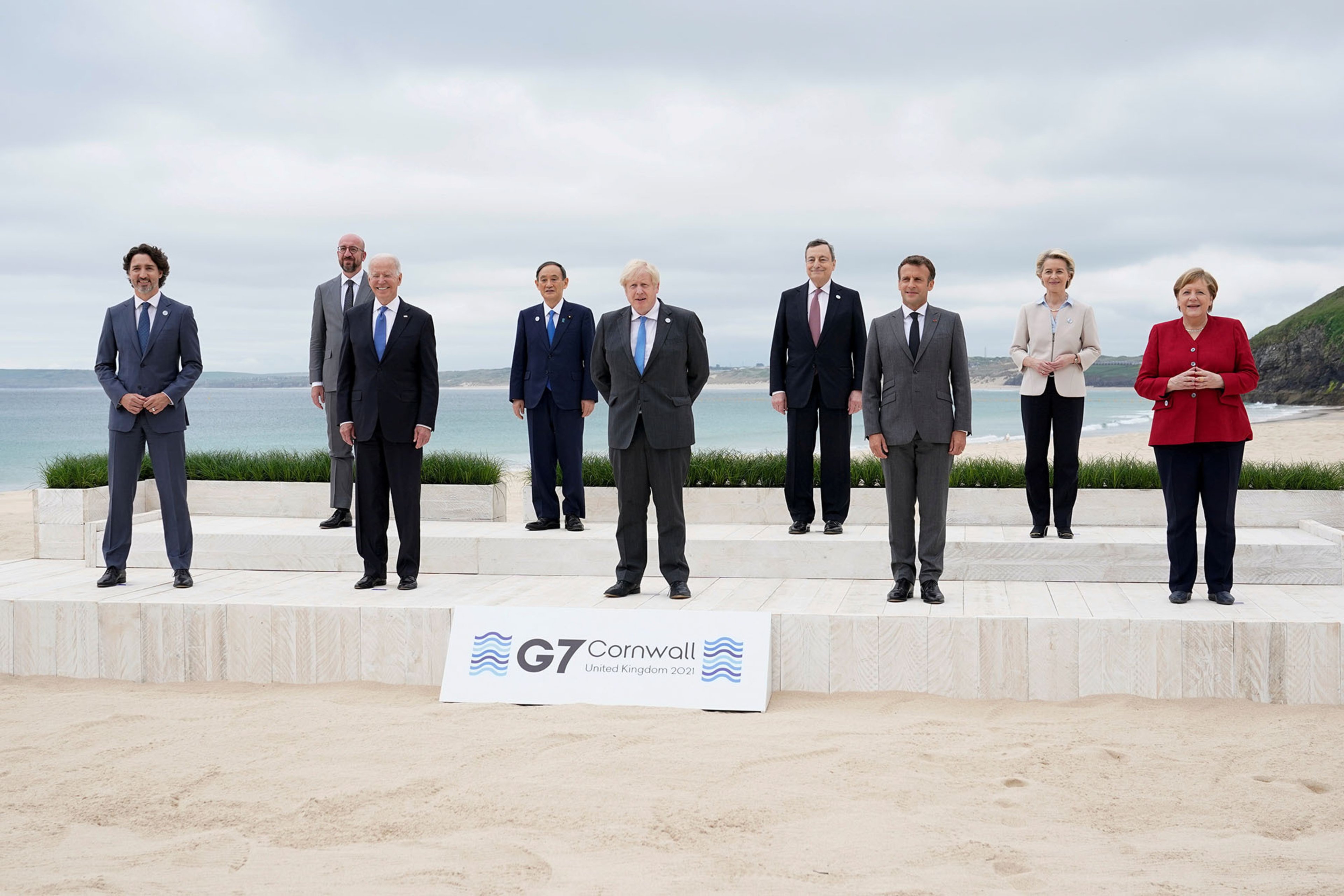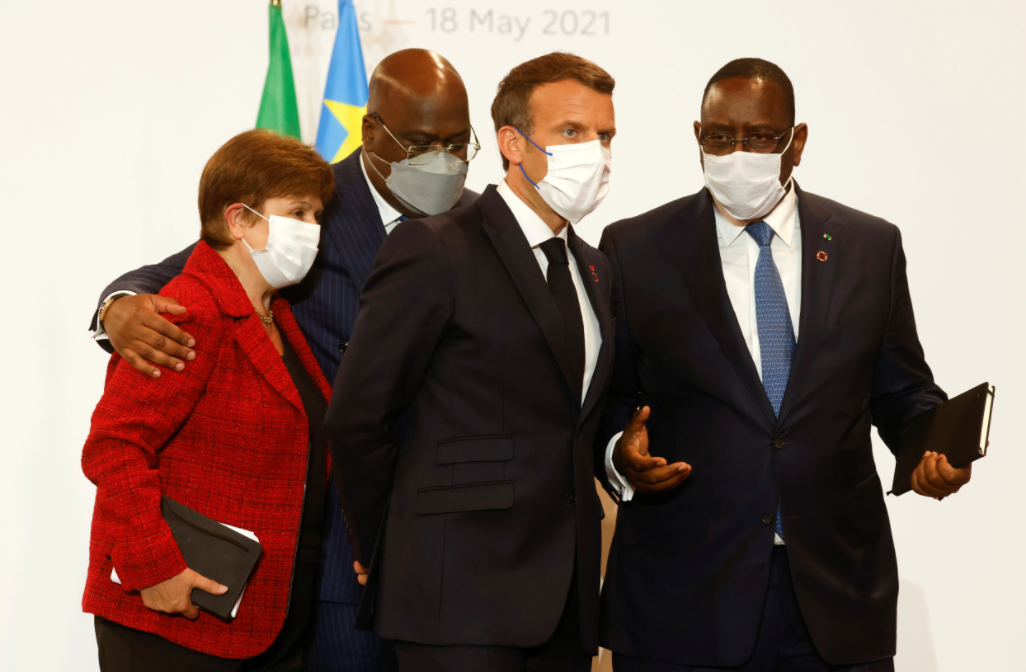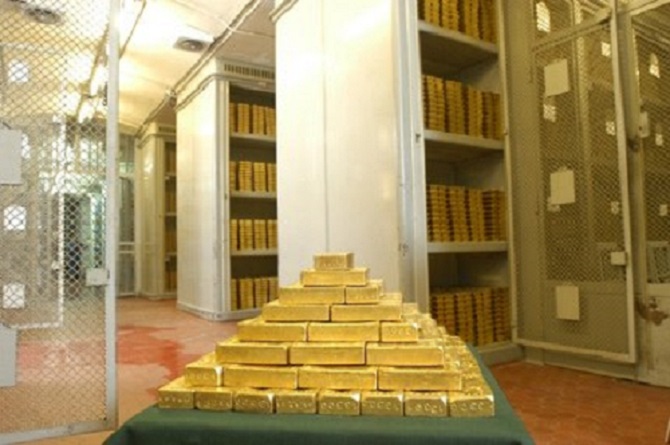The possibility of renewed monetary gold sales by the International Monetary Fund (IMF) hit international headlines last month when France’s president and former Rothschild banker, Emmanuel Macron, made a call for such sales during a press conference in the Elysée Palace in Paris on 10 June, in advance of the G7 summit in England a few days later.
G7 Rothschild Banker
In his 10 June speech, titled “G7 / NATO Press Briefing”, while referring to plans to finance African economies via a new allocation and redistribution of Special Drawing Rights (SDRs), Macron said that the SDR plan:
“should be supplemented with an agreement to also sell some of our gold reserves and finance investment. Why? Because IMF gold reserves have risen in value because of the crisis. Because gold has been a haven for investors. We should give this excess profit to the poorest countries, particularly in Africa.”
(G7 / NATO – President Emmanuel Macron – Press Briefing (Elysée Palace, 10 June 2021)

While some media reporting at the time said that Macron was calling for the Group of Seven (G7 – France, Germany, Italy, Japan, UK, US, Canada) to sell some of their monetary gold reserves, this is not the case, and he was specifically talking about IMF gold. To see why this is so, we need to look at the context in which Macron made the 10 June remarks, where he also said:
“At the Paris Summit, France undertook to [reallocate its new SDRs to Africa], so that at least $100 billion goes to African economies. In truth, we need to aim for $150 billion. We will do everything we can to reach a consensus [with other rich countries] on that [reallocation].”
“The G7 Summit should enable us to reach this historic agreement, with the aim of ensuring at least $100 billion in special drawing rights go to Africa.”
‘Let’s do this for Africa’
The Paris Summit to which Macron was referring was the “Summit on the Financing of African Economies” which was held in Paris on 18 May 2021, and which was attended by a large group of African heads of state, as well as some European heads of state, and in addition the usual suspects from the international institutions of the G20, G7, IMF, World Bank, OECD, EBRD and African Development Bank. The head of the IMF, Kristalina Georgieva, was also in attendance, and she even gave a conference speech.
In line with the coordinated global political playbook on everything from fiscal and monetary stimulus to WEF reset propaganda, governments and institutions at the Paris Summit played the Covid card in calling for the need to massively finance Africa with a literal ’Build Back Better’. Surprisingly, they didn’t wheel out Klaus Schwab, who must have been otherwise engaged that day.
This Paris Summit on 18 May had itself arisen following an OpEd letter about financing African economies published in the Financial Times on 14 April which was signed by the heads of nine African countries and the leaders of France (Macron), Germany (Merkel), Italy, Netherlands, Spain, Portugal, plus the presidents of the European Commission (Ursula von der Leyen) and European Council.
The SDRs that Macron referred to are US$ 650 billion in new proposed SDRs that the Group of Twenty (G20) Finance Ministers and Central Bank Governors, at a meeting on 7 April 2021, called on the IMF to ‘create’ so as to ‘meet the long-term global need to supplement reserve assets’.
However, based on existing IMF country quotas and allocations, of this US$ 650 billion in new SDRs, African countries in total would only receive US$ 34 billion and of this, sub-Saharan Africa would receive $24 billion in news SDRs. It was this that Macron said needed to be boosted by reallocating or donating SDRs from developed to developing countries so as to increase the African total to $100 billion. [For a background on SDRs, see here].

And this is where it gets interesting. For at a news conference on 18 May after the Paris Summit on the Financing of African Economies, France’s Macron, the ex-Rothschild banker, called for governments to support the sale of IMF gold reserves:
“Macron told the news conference that several rich countries had agreed to turn their share of the SDRs over to African countries because $33 billion “is too little”, hoping that voluntary contributions could boost the African share to $100 billion, to which the IMF could add some of its gold reserves.”
In the words of Reuters, which reported on the Summit:
“Macron also said governments should look at how IMF gold reserves can be used to overcome some countries’ reluctance to reallocate their SDRs to African countries.”
Here, Macron seems to be giving the game plan away. A number of ‘rich countries’ with high IMF quotas (US, Germany, France, Britain, Italy, Japan, China etc) will (by prior agreement) refuse to reallocate their SDR allocations to African countries. The G20 will then call for the IMF to endorse IMF gold sales to ‘top up’ the SDR redistributions to Africa. And hey presto, the IMF will sell more of its gold. All pre-agreed theatre.
Marcon Puppet Show – Put the Topic on the Table
Not unexpectedly, Macron’s calls for IMF gold sales did not just appear at the Paris summit on 18 May, but were actually pitched by Macron’s advisers at the Elysée Palace (The President’s office) prior to the 18 May Summit.
On 16 May we find European media coverage saying that:
“Speaking to journalists on the eve of the Summit on Financing African Economies, taking place Tuesday in Paris with the presence of dozens of African heads of state, advisers to French President Emmanuel Macron announced that the sale of gold will be an idea that the president will present at the meeting.
France will propose that the International Monetary Fund (IMF) sell part of its gold reserves and increase the amount of dedicated funds for the most vulnerable economies, especially the economic recovery of sub-Saharan Africa.
A Macron adviser said: “One of the points we are trying to emphasize is to consider the idea of talking about IMF gold sales, which will increase market confidence and allow loans with interest rates close to zero in African countries.”
The official emphasized that “the decision will definitely not be made on this matter as early as Tuesday”, and he emphasized that “the idea is to put the topic on the table, saying that Special Drawing Rights should be used mainly by low-income countries, namely African countries.”
Therefore, Macron’s IMF gold sales pitch was not some off the cuff remark, but a carefully crafted plan, one that he and his advisers were trying to emphasize and to “put the topic on the table”.
Gold is Real – SDRs are Not
But why do they want to put the topic of IMF gold sales on the table? Which puppet master is controlling Macron’s strings and who benefits? Who in the ‘international community” is the Macron puppet show a mouthpiece for?
The G7? The G20 Finance Ministers and Central Bank Governors? The IMF itself in Washington DC with the Americans making the proposal behind the scenes? Does the Banque de France want to get its hands on the IMF gold stored in Paris, or perhaps it is the New York Federal Reserve or Bank of England which want access to the IMF gold in New York and London, respectively?
Is this another bullion bank bailout or a redistribution of central bank gold reserves behind the scenes? Did Macron receive a call from an old boss?
In the secretive world of central bank gold transactions, it is the anonymous buyer who benefits from gold sales. Not the publicly known seller. Just ask the UK Treasury and the Canadian Finance Ministry, when they were both pressurised sell large quantities of their sovereign gold reserves in the 1980s and 1990s, respectively. (see discussion of Canada gold sales in Gold Sextant here, and a Max Keiser documentary about UK gold sales – Brown’s Bottom here). So, who are the intended buyers of IMF gold now that Macron is shilling for?
Physical sales of IMF gold are certainly not needed to finance African economies or to supplement SDR creation. For that, the developed countries have unlimited printing of fiat currencies. Note the multi-trillions in fiscal and monetary stimulus which they are creating right now. Even the creation and allocation of the upcoming US$ 650 billion of SDRs is out of thin air. As Macron said in his 10 June speech:
“We have advocated, since November last year, at the Paris Peace Forum, an exceptional allocation of special drawing rights of the International Monetary Fund. What does that mean? It is an increase in the reserves of the International Monetary Fund which, in a way, amounts to money creation for the members’ economies.”
Besides, selling a percentage of IMF gold, example 400 tonnes, would only produce proceeds of $23 billion, and usable profits of $19 billion, far less than the African SDR targets, and equal to only 2.9% of the US$ 650 billion in new SDRs. Selling 800 tonnes of IMF gold would only produce usable profits of $38 billion (about 5.8% of the new SDRs and about equal to say Germany’s IMF quota SDR allocation).
Relative Pittance for Gold Sales
We can see this by looking at the proceeds and profits of IMF gold sales the last time the IMF claimed to have sold gold – just over a decade ago. The IMF claims to have sold 403.3 tonnes of gold over 2009-2010. This was when Frenchman Dominique Strauss-Kahn (DSK) was head of the IMF. Those gold sales netted a claimed US $14.4 billion. This means that the average sales price was around $1,111 per troy ounce. When the IMF sells gold, only the profits over the book value of that gold can be used for IMF assistance. In the 2009-2010 IMF gold sales, about 72% of the proceeds were in the form of profit, which means that the book value of gold sold was about $310 per ounce.
Assume the IMF did sell more gold later in 2021 and into 2022, for example another 400 tonnes of gold. At an average price of $1800 per oz, a sale of 400 tonnes would provide proceeds of $23.15 billion. Of this, about $3.986 billion would be book value, meaning profits of $19.16 billion. A sum of $19 billion is nothing in the world of G20 / G7 accounting, and nothing compared to the unlimited monetary expansion of the G7 central banks where trillions have been created out of thin air since March 2020 and before.
So you can be sure that the Macron gold sales proposal ‘for Africa’ has nothing to do with Africa, and everything to do with central banks and their bullion bank counterparts wanting to get their hands on the IMF gold.

The IMF claims to currently hold 2,814 tonnes of gold (90.5 million ozs) across four ‘designated depositories’ in New York, London, Paris and Nagpur (India). These four depositories are the New York Federal Reserve, the Bank of England, the Banque de France and the Reserve Bank of India (Nagpur). See this BullionStar article here for details of the IMF gold storage locations.
IMF Gold Sales – Where Transparency Means Secrecy
Prior to October 2009, the IMF claimed to hold 3,217.3 tonnes of gold, but then in late 2009 and through 2010, it claimed to have sold a total of 403.3 tonnes of gold in a series of off-market and on-market sales. The off-market sales were a claimed 222 tonnes of gold sold to the central banks of India, Sri Lanka, Bangladesh and Mauritius during mostly late 2009, and a total of 181.3 tonnes in on-market transactions during 2010.
However, the 181.3 tonnes of IMF on-market sales transactions in 2010 were nothing of the sort, as there were no actual sales on any ‘market’. In fact, no one outside the IMF and BIS (which was used as the sales agent) knows to who that gold was sold. This is because the transactions were shrouded in secrecy, and the IMF documents concerning these sales are still classified as “Secret” and “Strictly Confidential”, because the IMF has “determined that the material remains highly confidential or sensitive.”
When in 2016, I asked the IMF about these documents (SM/09/243 (Staff memorandum) and DEC/14425 (Text of Board Decisions): “Modalities for Limited Sales of Gold by the Fund”) which included an Executive Board briefing on the plans for on-market sales, the IMF replied that:
“these particular documents are still deemed classified”
“The reports after May 2010 haven’t been declassified for public access because of the sensitivity of the subject matter, and therefore they are not available for retrieval.”
“according to security classification they are currently closed.”
See BullionStar article “IMF Gold Sales – Where ‘Transparency’ means ‘Secrecy’” for a full background of the IMF’s secretive 2010 gold sales.
In July 2021, these two IMF documents are still not accessible in the IMF archive database, nearly 12 years after they were created. How’s that for IMF secrecy about its so-called transparent gold sales? And shockingly, any “Secret” and “Strictly Confidential” IMF documents can only de declassified “upon consent of the IMF Managing Director.”
The secrecy surrounding these 2010 IMF gold sales suggests that the recipients of the gold sold in 2010 were either bullion banks needing a bailout of physical gold (possibly to pay back central bank gold loans), or were part of a behind the scenes re-distribution of gold from western central banks to the Chinese central bank. And you can take it for granted that any future sale of IMF gold either this year or next year will be for the same reasons, all the while the political puppets and their central bank masters will plead that ‘its for Africa!’ The African tactic is a tried and tested smokescreen for central bank gold sales and has been used all the way back to the G7 gold sales of the 1990s. So why not wheel it out again and again?
The 2009 Playbook?
In 2009, the G20 was used as frontman for pushing for IMF gold sales, with the communiqué from the OECD organized G20 Summit in London in April 2009 calling for “agreed IMF gold sales”. Not surprisingly, the 2009 G20 scheme also played the Africa card as justification for the gold sales in the wake of the ‘global crisis of 2008-09’ (which as everyone knows was created by the very same central banks). The April 2009 G20 communiqué said:
“we have committed, consistent with the new income model, that additional resources from agreed sales of IMF gold will be used, together with surplus income, to provide $6 billion additional concessional and flexible finance for the poorest countries over the next 2 to 3 years. We call on the IMF to come forward with concrete proposals at the Spring Meetings;”
That this was all theatre between the G20 and IMF can be seen from the fact that the April 2009 G20 communiqué was even hosted on the IMF website here, with the IMF then followed the G20 the script to a tee. By the end of July 2009, the IMF stated that because “the global financial crisis has swept from developed to developing countries…the IMF has agreed to increase concessional resources” including “revenue from envisaged IMF gold sales”.
These gold sales were then approved by the IMF Board on 18 September 2009, endorsed by the OECD organized G20 Summit in Pittsburgh in September 2009, and then the first claimed transaction of a sale of 200 tonnes of IMF gold to India supposedly took place by 2 November 2009. Note that the OECD, which is at the core of organizing the G20 summits, is also headquartered in Paris, France. In this drama, all roads seem to lead to Paris.

Will a similar playbook be followed in 2021?
So will a similar playbook be followed in 2001? Macron and his advisers have already planted the idea of new IMF gold sales, doing so in Paris during May, and like in 2009 where the ‘Great Financial crisis – help Africa’ card was used as justification for IMF gold sales, they are now using the ‘Covid crisis – help Africa’ card as justification for further IMF gold sales.
Macron also rolled out the IMF gold sales plan to the G7 on 10 June, doing so in advance of the G7 Summit (which was held in Cornwall, England between 11-13 June).
On 8 July 2021, facilitated by IMF head, Kristalina Georgieva, the IMF Executive Board agreed to the allocation of $650 billion in new SDRs, with the IMF Board of Governors due to ratify this soon, and the new SDRs expected to be available by the end of August. The IMF’s Georgieva also continues to be on board with the general plan, and she even wrote a blog post about SDRs and African financing on 7 July.

The only thing missing at the moment is a G20 call for IMF gold sales. This is surprising since the G20 held its latest summit a few days ago in Venice between 9-10 July 2021, where the G20 Finance Ministers and Central Bank Governors met in person and wheeled out such New World Order agendas as global taxation, ‘climate change’, and ‘pandemic preparedness’, which are a series of the latest smoke and mirrors distractions to prolong the global debt system, concentrate global asset ownership, and prop up global financial markets. While there was talk of helping vulnerable countries at the G20 meeting, the resulting communiqué stopped short of commenting on IMF gold sales, only saying that:
“We support the proposal to the IMF Board of Governors of a new general allocation of Special Drawing Rights (SDRs) in an amount equivalent to USD 650 billion to help meet the long-term global need for reserve assets and urge its swift implementation by the end of August…. To significantly magnify the impact of the allocation, we call on the IMF to quickly present actionable options for countries to voluntarily channel a share of their allocated SDRs to help vulnerable countries”.
But strangely, no mention of Macron’s proposed IMF gold sales. So, is this another slap in the face for the ex Rothschild banker? A snub for the Banque de France? Or are the IMF gold sales plans still on track but a little less imminent?
One possibility is that there has been significant pushback from some powerful IMF quota countries and their central banks who are opposed to further IMF gold sales, pushback which does not want the IMF to part with real physical gold. This is an intriguing possibility which would show that the IMF or some of its powerful member countries view the IMF gold as too valuable to part with.
Another possibility is that the IMF gold sales will go ahead, but that various further agreements have to take place among the G7 / G20 members before further publicizing the plan and before pushing the agenda through to the IMF for ratification.
Conclusion
Of the 12 managing directors of the IMF since 1946, a staggering 5 of these have been from France, with Dominique Strauss-Kahn (DSK) and Christine Lagarde (current head of the European Central Bank (ECB)) being the most recent two before the current head, Kristalina Georgieva (from Bulgaria), took office in October 2019. France has a disproportionally large influence on the IMF and has always had. It would not be surprising then that the international banking establishment would use France’s Macron to ‘put the idea on the table’ calling for IMF gold sales. Lagarde continues to have influence in Europe and France as current head of the European Central Bank (ECB). The Strauss-Kahn also continues to have influence in global gold market’s with DSK’s sister-in-law, Isabelle Strauss-Kahn, currently on the board of directors of the London Bullion Market Association (LBMA) in London.
But to what end? Official sector gold sales, be it by the IMF or by central banks, are often pitched by the mainstream financial media (and interpreted by market algos) as being negative for gold. IMF gold sales, or even talk of IMF gold sales, will tend to be a factor that the mainstream financial media and the paper gold establishment (World Gold Council and LBMA) will try to milk in order to conjure up caution in gold markets that there is an ‘overhang’ of physical gold sales which are ‘holding back’ the gold price. When in fact it is the very structure of fractionally-backed (unallocated and gold futures trading) that is actually ‘holding back’ the price. But talk of IMF gold sales or even news of actual sales only ‘fools’ the market for so long.
It is therefore more realistic to assume that Macron is calling for IMF gold sales because that physical gold is needed elsewhere, be it bullion bank bailouts for repaying central bank gold loans, or redistribution of monetary gold behind the scenes to recipients such as China.
But will there be any new IMF gold sales, or was Macron’s proposal a flash in the pan? For now we don’t know, so until later in the year it’s a case of ‘Watch this Space!"


